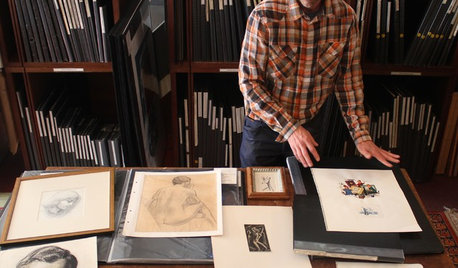How much do you care about accuracy?
jolimont
18 years ago
Related Stories

BEDROOMSGuessing Game: What Might Our Bedrooms Say About Us?
For entertainment only; actual accuracy may vary. Always don fun goggles and engage your imagination before playing!
Full Story
GARDENING GUIDESTree Care: Common Tree Diseases and What to Do About Them
Learn to recognize trees that may be affected by diseases or pests so you can quickly take action
Full Story
LIGHTINGWhat to Know About Switching to LED Lightbulbs
If you’ve been thinking about changing over to LEDs but aren't sure how to do it and which to buy, this story is for you
Full Story
COMMUNITYWant a Cleaner, Safer Neighborhood? Show You Care
Our behavior strongly influences others, says a new study. Show neighbors you care about your street and watch them follow suit
Full Story
KITCHEN DESIGNKitchen Counters: Stunning, Easy-Care Engineered Quartz
There's a lot to like about this durable blend of quartz and resin for kitchen countertops, and the downsides are minimal
Full Story
ARTThe Best Ways to Care for, Clean and Store Art
Keep your treasures on canvas and paper in top shape with this expert advice from two gallery directors
Full Story
CONTEMPORARY HOMESHouzz Tour: Careful Space Planning Simplifies Life for a Family of 6
Redesigned rooms, streamlined cabinetry and strategic color choices keep this home organized and clutter-free
Full Story
HOUSEKEEPINGHow to Clean and Care for Your Mattress
See what the experts recommend to protect your mattress from dust, moisture and stains
Full Story
HOME TECHTo Feed and Protect: Care for Your Pet From Afar With New Devices
You might miss the nuzzles, but your dog or cat won't miss food, water or monitoring with these high-tech feeders and cameras
Full Story



netla
netla
Related Discussions
Part of Fig don't care about to much-How about you
Q
Watering Cottage Gardens - Do You, How Do You, How Much
Q
Do you care about your lawn?
Q
what do you know about long term care insurance
Q
cindydavid4
veer
cindydavid4
ccrdmrbks
mariannese
mwoods
biwako_of_abi
Chris_in_the_Valley
carolynlouky
larryp
cindydavid4
janalyn
rosefolly
ccrdmrbks
cindydavid4
jolimontOriginal Author
Chris_in_the_Valley
ccrdmrbks
cindydavid4
cindydavid4
ccrdmrbks
ccrdmrbks
friedag
ccrdmrbks
cindy_ash
mummsie
ccrdmrbks
martin_z
cjoseph
Chris_in_the_Valley
cindydavid4
jolimontOriginal Author